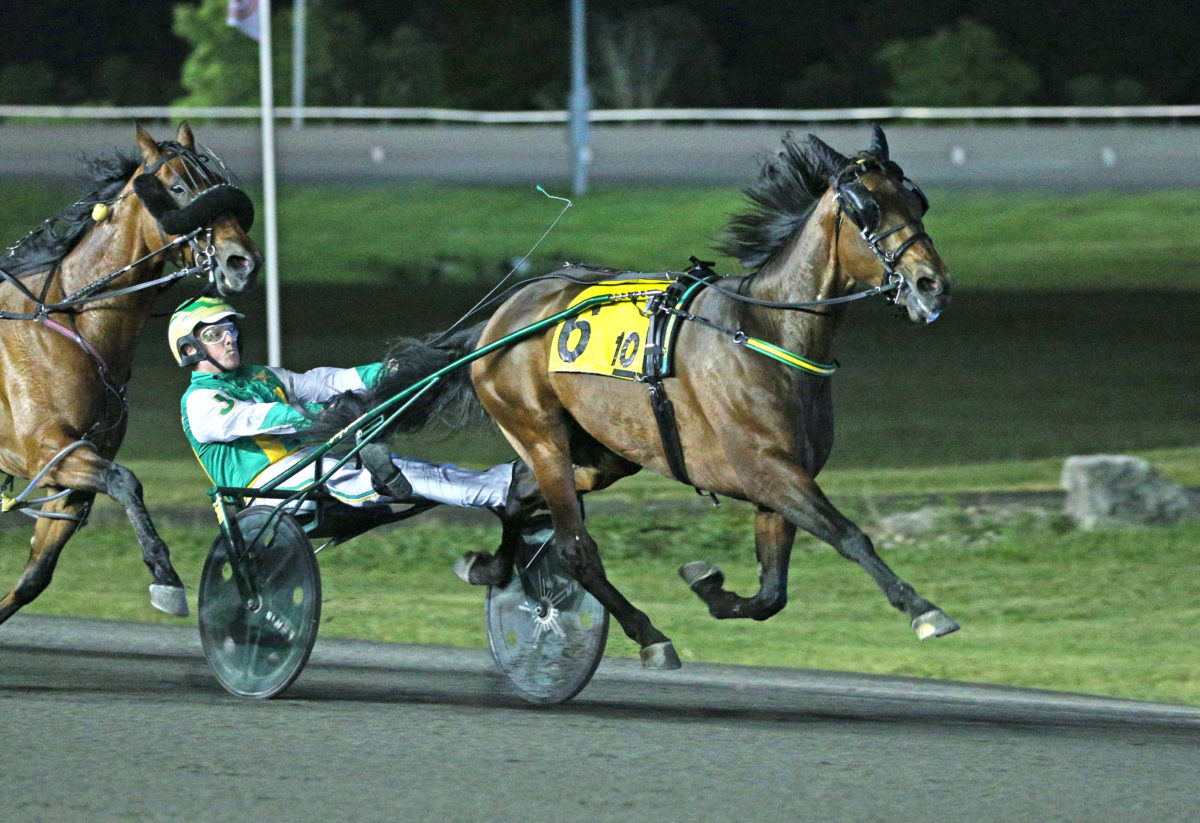A deeper dive into Mohawk’s attempt to fill fields
by Melissa Keith
Classifying horses when there are fewer to classify is the ongoing challenge for Woodbine Mohawk Park’s race secretary. Entries are affected by a range of factors, few more important than the currency exchange. Wednesday, the Canadian dollar was worth .78 American, making even Canada’s highest purses a harder sell.
“Yeah, there’s no doubt. It’s a business, right?” said Tony O’Sullivan. “I first came here in 2000 with Ross Croghan, and Canada was ‘the boom.’ Our dollar was stronger at some points in the mid-2000s, it was even stronger or at par. So I think that is a factor, and also there’s money in most jurisdictions in the U.S. Yonkers obviously is very big. Ohio is really growing. Kentucky has an influx of money.”
Writing conditions that suit Mohawk regulars addresses that escalating demand for racing stock.
“It’s a juggling act. I mean, we have kind of our staple people who come and race here. We try to be creative with the condition sheet and add these new series and just tweak the conditions a little bit,” he said. “Some weeks, it’s really good. Some weeks, it’s light, but you’ve just got to keep trying. You obviously can’t put anything on that’s completely off the wall.”
“I talk to trainers. Most of them, you know, they’ll call once in a while or shoot a text, and obviously [racetrack] management talk about things. We talk with COSA, the horsemen’s association, and just try to get a feel for what people are thinking, and try to accommodate as many trainers and horses of every caliber as we possibly can.”
While some owners have expressed dissatisfaction about Mohawk classes online, the feeling isn’t unanimous.
Doug Polley Jr. of Amherst, NS co-owns recent winner Wind Blown (p, 5, 1:49.4s; $172,391) with his father Doug Sr., and Gordon and Joann McComb of Paris, ON. The free-legged Mach Three–Wind Warning gelding took a new lifetime mark at the Campbellville track last Friday (June 10).
“At Mohawk, they go by your last five money earnings, and so his last five, he gets to the non-winners of $29,500 class, because he’s got over $16,000 made his last five,” said Polley Jr., who doesn’t hesitate to bring his stock back to the Maritimes if he thinks they fit better.
Wind Blown is a Saturday-night horse, however, on Canada’s biggest stage. He’s moving up in class on the June 18 North America Cup undercard, following his milestone victory over “non-winners of $8,600 last 5 starts or non-winners of $19,000 last 10 starts; also eligible non-winners $90,000 lifetime.”
Polley Jr. observed that his horse stepped up to win at a classification above that which he ideally fit.
“He could have been down to even another class beyond that, but they didn’t have a class to give him, so he did win that [higher] class. He was under $8,000 [in earnings for previous 5 starts]. Usually they have a different class for that, but he won, so we can’t complain.”
The Ben Hollingsworth trainee will now take on “non-winners of $16,000 last 5 starts or non-winners of $29,500 last 10 starts; also eligible $60,000 claimers; non-winners $120,000 lifetime.” Polley Jr. said Wind Blown’s latest win puts him, “just over that, for the money earnings. He’s got like $17,000 made.” The experienced owner takes the class jump in stride: “I guess we win every four or five races, probably. There’s not much we can say bad about that.”
Finding spots for his younger horses is harder, he said.
“Most of them are just not good enough for Mohawk,” said Polley Jr., assessing not just his own stable but the horse population in general. “It’s very, very tough at Mohawk,” which makes winning extra special, according to the horseman who enjoyed considerable success there with recently-retired Rockin In Heaven (p, 6, 1:49.2s; $854,552). “He was an upper-class horse all his life, so again [classification is based on] money earnings. His were always quite high.”
For lower-earning horses, the best place to race isn’t necessarily a smaller track.
“Grand River drew [last Tuesday] and they were short as well” as Mohawk, O’Sullivan told HRU, adding that all tracks are facing the same issue.
“I think in a nutshell, it’s a supply and demand problem: We don’t have enough horses to service the amount of race days we have. I think in the short term, with the 2-year-olds coming in and through the season, it should pick up for sure and give us some leeway in what we can do.”
He pointed out that horses competing at The Raceway at Western Fair had mainly migrated to smaller tracks, not Mohawk, after the meet at Canada’s #2 track by handle concluded last month.
“Now we have Clinton, Hanover, Dresden and Grand River, so that doesn’t really help, because there are other spots for those horses to race,” said the former trainer. “We don’t get a lot from that area. They seem to stick to themselves a little bit, but we certainly get a few of them coming down, and obviously we welcome them.”
Grand Circuit horses are also fewer in number than when O’Sullivan himself was training.
“In terms of guys from the U.S. coming, I think the staffing issues that every industry is facing are a huge issue,” he said. “It used to be that a trainer could send a string of horses somewhere and know that they had enough people to take care of them. It seems now that that’s not the case. They’re sending one person up, and they’re hiring help for race nights.”
Horses from jurisdictions with lower purses often improve on the 7/8-mile track, which benefits both their connections and field size.
“We send out texts and tweets and things on the website, but from Mohawk’s perspective, I’m writing conditions accommodating pretty much every horse possible,” said O’Sullivan. “It would be good if people bring them and see what they can do on the big track, as opposed to thinking that they just purely can’t do any good.”
Polley Jr. doesn’t know O’Sullivan personally, but agreed that it’s worth it to roll the dice to see if, and where, a horse belongs in Campbellville.
“You can always find a class, whether it’s the right class or not. It snowballs from there, right? Once they get a little confidence, a lot of times they’ll get better every race. Mohawk is very fair, really.”


















